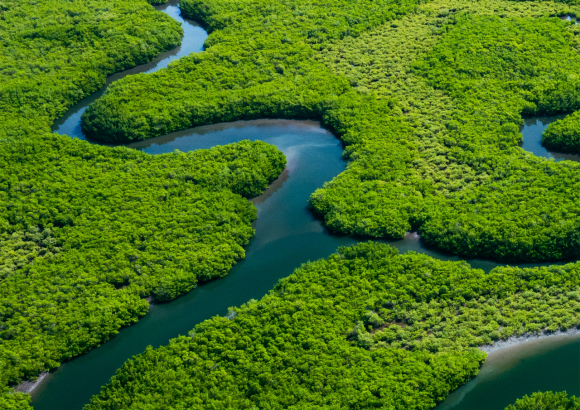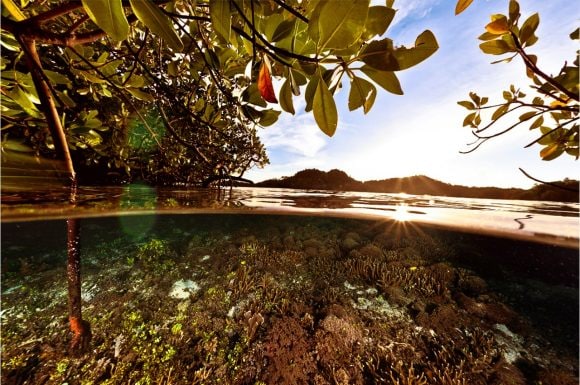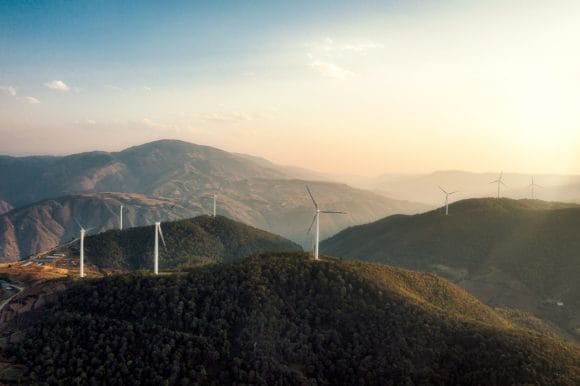Our sustainability and impact experts regularly produce insights, thought leadership and inspiring stories that can support you in becoming a more impactful change-maker.
Latest insights
Get inspired
Green Streak
Unlocking more funding for land
Read our green streak reportLand sustains life - storing carbon, supporting communities, and protecting biodiversity. Green Streak explores how philanthropy can help restore and conserve these vital ecosystems.
Dig deeperBlue Streak
Protecting our ocean
of protecting our oceanThe ocean sustains us all – producing over half the oxygen we breathe, regulating our climate, and supporting over 3 billion people. But warming waters, pollution, and habitat loss are accelerating. Protecting ocean health is essential – for people and planet.
Dive deeperVirtuous circles
The circular economy: an explainer for Swiss companies
of Virtuous circlesThis explainer report, aimed at Swiss firms, outlines the drivers behind the circular economy’s growing popularity, its implications for companies, and how banks can support corporates.
Download the reportUBS Philanthropy Compass
What exactly does making an impact mean? How can you successfully support a solution or program? And is there a way you can collaborate with others to amplify your impact? Find out the answers in our comprehensive compass workbook.
Read more UBS philanthropy compassAIm high
Read our AIm high white paperAs the AI roll-out gathers pace, we find ourselves at an inflection point. The decisions taken in the next few years will decide whether AI's upsides are fully realized and its risks adequately mitigated.
Our white paper contains insights on how to optimize AI’s consequences for human capital, via its impacts on education, workplace productivity, and health.
Read the white paperGreen hockey sticks
Read our Green hockey sticks reportDecarbonization is underway. In power and transport, climate technologies already outcompete carbon-intensive incumbents. This report analyzes key climate techs, identifying decadal goals, progress to date, and economic tipping points that could unleash the necessary hockey stick-shaped growth to meet climate goals.
Read the reportRethink, rebuild, reimagine
Laying the foundations for better buildings
Read the white paper
Learn more
Did you know?
The United Nations Sustainable Development Goals (SDGs) were adopted as a call to action to end poverty, protect the planet, and ensure peace and prosperity for all by 2030. Only a few years remain to achieve the SDGs, yet progress and funding are stalling: the current annual SDG funding gap is at least USD 4.3trn3. This shortfall is greatest in low income countries, where these resources are needed the most, with USD1.6trn more needed annually in Africa alone. More philanthropic capital mobilized can help fill the critical funding gap.
- USD 0 trnneeded annually to achieve SDGs by 2030¹
- USD 0 bncontributed annually by philanthropy²
- USD 0 trnannual funding gap to meet SDGs³
Sources:
1 UN (2023), retrieved from https://news.un.org/en/story/2023/09/1140997 .
2 Citi GPS (2022), Philanthropy and the Global Economy: Opportunities in a World of Transition.
3 OECD (2023), Bottlenecks to Access Sustainable Development Goals Finance for Developing Countries, OECD, Paris
Become an expert
Are you looking to make a real difference in the world through your philanthropy, but aren’t sure where to turn next? Our UBS Philanthropy Academy offers the knowledge and tools you need to become a more effective change-maker.
Through our philanthropy experts, who have the unique perspective of working in or with the UBS Optimus Foundation, you’ll learn how to create strategies that align with your values and goals, measure the impact of your donations and investments and much more.
If eligible for membership, you’ll also be offered the opportunity to connect with likeminded individuals in our Global Philanthropists Community and build a network of change-makers who are also committed to having a positive impact in the world.

This document has been prepared by UBS Switzerland AG and/or any of its subsidiaries or affiliates ("UBS"), part of UBS Group AG ("UBS Group"). UBS Group includes Credit Suisse AG, its subsidiaries, branches and affiliates (hereinafter Credit Suisse). Additional Disclaimer relevant to Credit Suisse follows at the end of this section. This document and the information contained herein are provided solely for information and UBS marketing purposes. Nothing in this document constitutes investment research, investment advice, a sales prospectus, or an offer or solicitation to engage in any investment activities. This document is not a recommendation to buy or sell any security, investment instrument, or product, and does not recommend any specific investment program or service.
Although all information and opinions expressed in this document were obtained in good faith from sources believed to be reliable, no representation or warranty, express or implied, is made as to the document’s accuracy, sufficiency, completeness or reliability. All information in this document is subject to change without notice and UBS is under no obligation to update or keep current the information contained herein. Source of all information is UBS unless otherwise stated. UBS makes no representation or warranty relating to any information herein which is derived from independent sources.
Asset classes, asset allocation and investment instruments are indicative only. Any charts and scenarios contained in the document are for illustrative purposes only. Some charts and/or performance figures may not be based on complete 12-month periods which may reduce their comparability and significance. Historical performance is no guarantee for, and is not an indication of future performance.
Nothing in this document constitutes legal or tax advice. UBS and its employees do not provide legal or tax advice. This document may not be redistributed or reproduced in whole or in part without the prior written permission of UBS. To the extent permitted by the law, neither UBS, nor any of it its directors, officers, employees or agents accepts or assumes any liability, responsibility or duty of care for any consequences, including any loss or damage, of you or anyone else acting, or refraining to act, in reliance on the information contained in this document or for any decision based on it.
UBS retains the right to change the range of services, the products and the prices at any time without prior notice. Certain services and products are subject to legal provisions and cannot therefore be offered world-wide on an unrestricted basis.
Please be reminded that all investments carry a certain degree of risk. Your attention is hereby drawn to such risk (which can be substantial). Some investments may not be readily realisable since the market in the securities is illiquid and therefore valuing the investment and identifying the risk to which you are exposed may be difficult. Some investments may be subject to sudden and large falls in value and on realisation you may receive back less than you invested or may be required to pay more. You should consult your UBS client advisor on the nature of such investment and carefully consider whether such investment is appropriate for you.
Additional Disclaimer relevant to Credit Suisse: This document is not directed to, or intended for distribution to or use by, any person or entity who is a citizen or resident of or located in any locality, state, country or other jurisdiction where such distribution, publication, availability or use would be contrary to law or regulation or which would subject Credit Suisse to any registration or licensing requirement within such jurisdiction. Except as otherwise specified herein, this report is distributed by Credit Suisse AG, a Swiss bank, authorized and regulated by the Swiss Financial Market Supervisory Authority. Your Personal Data will be processed in accordance with the Credit Suisse privacy statement accessible at your domicile through the official Credit Suisse website https://www.credit-suisse.com. In order to provide you with marketing materials concerning our products and services, UBS Group AG and its subsidiaries may process your basic Personal Data (i.e. contact details such as name, e-mail address) until you notify us that you no longer wish to receive them. You can optout from receiving these materials at any time by informing your Relationship Manager. If you have any queries/objections relating to the receipt of marketing materials from us, please contact our Data Protection Officer at dataprotectionofficer.pb@credit-suisse.com (for Credit Suisse AG, HK Branch) or PDPO.SGD@credit-suisse.com (for Credit Suisse AG, SG Branch) or csau.privacyofficer@credit-suisse.com (for Credit Suisse AG, Sydney Branch).
Country-specific disclaimers: Additional country-specific disclaimers relevant to Credit Suisse follow at the end of this section. Brazil: This publication is not intended to constitute a public offer under Brazilian law or a research analysis report as per the definition contained under the Comissão de Valores Mobiliários (“CVM”) Resolution 20/2021. It is distributed only for information purposes by UBS Brasil Administradora de Valores Mobiliários Ltda., entity regulated by CVM. Canada: UBS Wealth Management is a registered trademark of UBS AG. UBS Bank (Canada) is a subsidiary of UBS AG. Investment advisory and portfolio management services are provided through UBS Investment Management Canada Inc., a wholly-owned subsidiary of UBS Bank (Canada). UBS Investment Management Canada Inc. is a registered portfolio manager and exempt market dealer in all the provinces with the exception of P.E.I. and the territories. Denmark: This publication is not intended to constitute a public offer under Danish law. It is distributed only for information purposes by UBS Europe SE, filial af UBS Europe SE with place of business at Sankt Annae Plads 13, 1250 Copenhagen, Denmark, registered with the Danish Commerce and Companies Agency, under No. 38 17 24 33. UBS Europe SE, Denmark Branch, filial af UBS Europe SE is subject to the joint supervision of the European Central Bank, the German Central Bank (Deutsche Bundesbank), the German Federal Financial Services Supervisory Authority (Bundesanstalt für Finanzdienstleistungsaufsicht, "BaFin"), as well as of the Danish Financial Supervisory Authority (Finanstilsynet), to which this publication has not been submitted for approval. UBS Europe SE is a credit institution constituted under German law in the form of a Societas Europaea, duly authorized by BaFin. France: This publication is not intended to constitute a public offer under French law. It is distributed only for information purposes by UBS Europe SE Succursale de France (a branch of UBS Europe SE), having its registered office at 69 boulevard Haussmann 75008 Paris, registered with the “Registre du Commerce et des Sociétés” of Paris under N°844 425 629. UBS Europe SE Succursale de France is subject to the joint supervision of the European Central Bank, the German Central Bank (Deutsche Bundesbank), the German Federal Financial Services Supervisory Authority (Bundesanstalt für Finanzdienstleistungsaufsicht, "BaFin"), as well as of the French "Autorité de contrôle prudentiel et de résolution" and "Autorité des marchés financiers", to which this publication has not been submitted for approval. UBS Europe SE is a credit institution constituted under German law in the form of a Societas Europaea, duly authorized by BaFin. Germany: This publication is not intended to constitute a public offer under German law. It is distributed only for information purposes by UBS Europe SE, Germany, with place of business at Bockenheimer Landstrasse 2-4, 60306 Frankfurt am Main. UBS Europe SE is a credit institution constituted under German law in the form of a Societas Europaea, duly authorized by the German Federal Financial Services Supervisory Authority (Bundesanstalt für Finanzdienstleistungsaufsicht, "BaFin") and supervised jointly by the European Central Bank, the German Central Bank (Deutsche Bundesbank) and BaFin, to which this publication has not been submitted for approval. Hong Kong: This publication is distributed by UBS AG Hong Kong Branch. UBS AG Hong Kong Branch is incorporated in Switzerland with limited liability. Israel: UBS is a premier global financial firm offering wealth management, asset management and investment banking services from its headquarters in Switzerland and its operations in over 50 countries worldwide to individual, corporate and institutional investors. In Israel, UBS Switzerland AG is registered as Foreign Dealer in cooperation with UBS Wealth Management Israel Ltd., a wholly owned UBS subsidiary. UBS Wealth Management Israel Ltd. is an Investment Marketing licensee which engages in Investment Marketing and is regulated by the Israel Securities Authority. This publication is intended for information only and is not intended as an offer to buy or solicitation of an offer. Furthermore, this publication is not intended as an investment advice. The word "advice" and/or any of its equivalent terms shall be read and construed in conjunction with the definition of the term "investment marketing" as defined under the Israeli Regulation of Investment Advice, Investment Marketing and Portfolio Management Law. Italy: This publication is not intended to constitute a public offer under Italian law. It is distributed only for information purposes by UBS Europe SE, Succursale Italia, with place of business at Via del Vecchio Politecnico, 3-20121 Milano. UBS Europe SE, Succursale Italia is subject to the joint supervision of the European Central Bank, the German Central Bank (Deutsche Bundesbank), the German Federal Financial Services Supervisory Authority (Bundesanstalt für Finanzdienstleistungsaufsicht, "BaFin"), as well as of the Bank of Italy (Banca d’Italia) and the Italian Financial Markets Supervisory Authority (CONSOB – Commissione Nazionale per le Società e la Borsa), to which this publication has not been submitted for approval. UBS Europe SE is a credit institution constituted under German law in the form of a Societas Europaea, duly authorized by BaFin. Jersey: UBS AG, Jersey Branch, is regulated and authorized by the Jersey Financial Services Commission for the conduct of banking, funds and investment business. Where services are provided from outside Jersey, they will not be covered by the Jersey regulatory regime. UBS AG, Jersey Branch is a branch of UBS AG a public company limited by shares, incorporated in Switzerland whose registered offices are at Aeschenvorstadt 1, CH-4051 Basel and Bahnhofstrasse 45, CH 8001 Zurich. UBS AG, Jersey Branch's principal place of business is 1, IFC Jersey, St Helier, Jersey, JE2 3BX. Luxembourg: This publication is not intended to constitute a public offer under Luxembourg law. It is distributed only for information purposes to clients of UBS Europe SE, Luxembourg Branch ("UBS Luxembourg"), R.C.S. Luxembourg n°B209123, with registered office at 33A, Avenue J. F. Kennedy, L-1855 Luxembourg. UBS Europe SE is a credit institution constituted under German law in the form of a Societas Europaea (HRB n° 107046), with registered office at Bockenheimer Landstrasse 2-4, D-60306 Frankfurt am Main, Germany, duly authorized by the German Federal Financial Services Supervisory Authority (Bundesanstalt für Finanzdienstleistungsaufsicht, "BaFin") and subject to the joint prudential supervision of BaFin, the European Central Bank and the central bank of Germany (Deutsche Bundesbank). UBS Luxembourg is furthermore supervised by the Luxembourg prudential supervisory authority (Commission de Surveillance du Secteur Financier), in its role as host member state authority. This publication has not been submitted for approval to any public supervisory authority. Mexico: UBS Asesores México, S.A. de C.V., (hereinafter, “UBS Asesores”), an affiliate of UBS Switzerland AG, is a non-independent investment advisor incorporated in accordance with Mexican Law, regulated and subject to the supervision of the National Banking and Securities Commission (Comisión Nacional Bancaria y de Valores, hereinafter, the “CNBV”), exclusively regarding the rendering of (i) portfolio management services, (ii) securities investment advisory services, analysis and issuance of individual investment recommendations, and (iii) anti-money laundering and terrorism financing matters. UBS Asesores is registered before CNBV under registry number 30060-001-(14115)-21/06/2016; such registry will not assure the accuracy or veracity of the information provided to its Clients. Likewise, UBS Asesores is not a credit institution, so it is not authorized to receive deposits in cash or of any other type, nor to safeguard securities and does not promote banking and credit services, either is part of any financial group. Finally, UBS Asesores: (i) does not offer guaranteed returns to its clients, (ii) has disclosed to its clients and suppliers any potential conflict of interest that could have before them, and (iii) can only charge the commissions expressly agreed upon with their clients for the investment services actually provided. UBS Asesores may not receive any commissions or any other type of remuneration from local or foreign issuers or intermediaries of the stock market, who provide services to their clients. Likewise, the information contained herein cannot be considered as an individualized recommendation unless expressly stated and through prior Agreement with UBS Asesores for the provision of an investment service. This UBS publication or any material related thereto is addressed only to Sophisticated or Institutional Investors located in Mexico. Monaco: This document is not intended to constitute a public offering or a comparable solicitation under the Principality of Monaco laws, but might be made available for information purposes to clients of UBS (Monaco) S.A., a regulated bank having its registered office at 2 avenue de Grande Bretagne 98000 Monaco operating under a banking license granted by the “Autorité de Contrôle Prudentiel et de Résolution” (ACPR) and the Monegasque government which authorizes the provision of banking services in Monaco. UBS (Monaco) S.A. is also licensed by the “Commission de Contrôle des Activités Financières” (CCAF) to provide investment services in Monaco. The latter has not approved this publication. Panama: UBS AG Representative Office is regulated and supervised by the Superintendency of Banks of Panama. Licence for operation of a Representative Office granted under the Resolution S.B.P. No 017-2007. UBS Switzerland AG Representative Office is regulated and supervised by the Superintendency of Banks of Panama. Licence for operation of a Representative Office granted under the Resolution S.B.P. No. 0178-2015. Russia: UBS Switzerland AG is not licensed to provide regulated banking and/or financial services in Russia. Information contained in this document refers to products and services exclusively available through and provided by UBS Switzerland AG in Switzerland or another UBS entity domiciled outside Russia. UBS employees travelling to Russia are neither authorized to conclude contracts nor to negotiate terms thereof while in Russia. Contracts only become binding on UBS once confirmed in Switzerland or in the location where the UBS entity is domiciled. The Wealth Management Advisory Office within OOO UBS Bank does not provide services for which banking license is required in Russia. Certain financial instruments can be offered in Russia only to the qualified investors. Any attachments and documents with reference to the specific financial instruments do not constitute a personal investment recommendation under Russian law. Singapore: This publication is distributed by UBS AG Singapore Branch. Clients of UBS AG Singapore branch are asked to please contact UBS AG Singapore branch, an exempt financial adviser under the Singapore Financial Advisers Act (Cap. 110) and a wholesale bank licensed under the Singapore Banking Act (Cap. 19) regulated by the Monetary Authority of Singapore, in respect of any matters arising from, or in connection with, the analysis or report. Sweden: This publication is not intended to constitute a public offer under Swedish law. It is distributed only for information purposes to clients of UBS Europe SE, Sweden Bankfilial, with place of business at Regeringsgatan 38, 11153 Stockholm, Sweden, registered with the Swedish Companies Registration Office under Reg. No 516406-1011. UBS Europe SE, Sweden Bankfilial is subject to the joint supervision of the European Central Bank, the German Central Bank (Deutsche Bundesbank), the German Federal Financial Services Supervisory Authority (Bundesanstalt für Finanzdienstleistungsaufsicht, "BaFin"), as well as of the Swedish supervisory authority (Finansinspektionen), to which this publication has not been submitted for approval. UBS Europe SE is a credit institution constituted under German law in the form of a Societas Europaea, duly authorized by BaFin. Taiwan: This material is provided by UBS AG, Taipei Branch in accordance with laws of Taiwan, in agreement with or at the request of clients/prospects. UBS AG and its branches in Taiwan (including Taipei branch, Taichung branch, Kaohsiung branch, Taipei Offshore Banking Branch and any other branches of UBS AG to be established in Taiwan; collectively, the “Bank”) have notified the clients (including prospects) of the purposes, scope and other matters with respect to personal data collecting, processing and usage, and have obtained the clients’ consent (or have not received objection) to use of their personal data. Based on such consent, the Bank sends you the materials. If you no longer want to receive such marketing info, please directly contact your UBS client advisor to notify the Bank to discontinue using of your personal data for marketing purpose. You can see the Bank’s Privacy Notice and the information regarding the collecting, processing and usage of personal data at https://www.ubs.com/global/en/legal/privacy/taiwan.html. UK: This document is issued by UBS Wealth Management, a division of UBS AG which is authorised and regulated by the Financial Market Supervisory Authority in Switzerland. In the United Kingdom, UBS AG is authorised by the Prudential Regulation Authority and is subject to regulation by the Financial Conduct Authority and limited regulation by the Prudential Regulation Authority. Details about the extent of regulation by the Prudential Regulation Authority are available from us on request. A member of the London Stock Exchange. USA: As a firm providing wealth management services to clients, UBS Financial Services Inc. offers investment advisory services in its capacity as an SEC-registered investment adviser and brokerage services in its capacity as an SEC-registered broker-dealer. Investment advisory services and brokerage services are separate and distinct, differ in material ways and are governed by different laws and separate arrangements. It is important that you understand the ways in which we conduct business and that you carefully read the agreements and disclosures that we provide about the products or services we offer. For more information, please review client relationship summary provided at ubs.com/relationshipsummary. There are two sources of UBS research. Reports from the first source, UBS CIO Wealth Management Research, are designed for individual investors and are produced by UBS Wealth Management Americas (which includes UBS Financial Services Inc.) and UBS Wealth Management. The second research source is UBS Investment Research, and its reports are produced by UBS Investment Bank, whose primary business focus is institutional investors. The two sources operate independently and may therefore have different recommendations. The various research content provided does not take into account the unique investment objectives, financial situation or particular needs of any specific individual investor. This material is not independent research and not subject to regulatory rules regarding research in the US. This material is intended for educational purposes only. If you have any questions, please consult your Financial Advisor. UBS Financial Services Inc. is a subsidiary of UBS Group AG.
Additional disclaimers for cross-border situations: Bahrain: UBS is a Swiss bank not licensed, supervised or regulated in Bahrain by the Central Bank of Bahrain to undertake banking or investment business activities in Bahrain. Therefore, prospects/clients do not have any protection under local banking and investment services laws and regulations. Czech Republic: UBS is not a licensed bank in Czech Republic and thus is not allowed to provide regulated banking or investment services in Czech Republic. This communication and/or material is distributed for marketing purposes and constitutes a "Commercial Message" under the laws of Czech Republic in relation to banking and/or investment services. Please notify UBS if you do not wish to receive any further correspondence. Indonesia, Malaysia, Philippines, Thailand, Singapore: This communication and any offering material term sheet, research report, other product or service documentation or any other information (the “Material”) sent with this communication was done so as a result of a request received by UBS from you and/or persons entitled to make the request on your behalf. Should you have received the Material erroneously, UBS asks that you kindly delete the e-mail and inform UBS immediately. The Material, where provided, was provided for your information only and is not to be further distributed in whole or in part in or into your jurisdiction without the consent of UBS. The Material may not have been reviewed, approved, disapproved or endorsed by any financial or regulatory authority in your jurisdiction. UBS has not, by virtue of the Material, made available, issued any invitation to subscribe for or to purchase any investment (including securities or products or futures contracts). The Material is neither an offer nor a solicitation to enter into any transaction or contract (including future contracts) nor is it an offer to buy or to sell any securities or products. The relevant investments will be subject to restrictions and obligations on transfer as set forth in the Material, and by receiving the Material you undertake to comply fully with such restrictions and obligations. You should carefully study and ensure that you understand and exercise due care and discretion in considering your investment objective, risk appetite and personal circumstances against the risk of the investment. You are advised to seek independent professional advice in case of doubt. Any and all advice provided on and/or trades executed by UBS pursuant to the Material will only have been provided upon your specific request or executed upon your specific instructions, as the case may be, and may be deemed as such by UBS and you. Portugal: UBS is not licensed to conduct banking and financial activities in Portugal nor is UBS supervised by the Portuguese Regulators (Bank of Portugal “Banco de Portugal” and Portuguese Securities Exchange Commission “Comissão do Mercado de Valores Mobiliários”). UAE/DIFC: UBS is not a financial institution licensed in the UAE by the Central Bank of the UAE nor by the Emirates’ Securities and Commodities Authority and does not undertake banking activities in the UAE. UBS AG Dubai Branch is licensed by the Dubai Financial Services Authority in the DIFC as an authorised firm. Ukraine: UBS is a premier global financial services firm offering wealth management services to individual, corporate and institutional investors. UBS is established in Switzerland and operates under Swiss law and in over 50 countries and from all major financial centers. UBS is not registered and licensed as a bank/financial institution under Ukrainian legislation and does not provide banking and other financial services in Ukraine. UBS has not made, and will not make, any offer of the mentioned products to the public in Ukraine. No action has been taken to authorize an offer of the mentioned products to the public in Ukraine and the distribution of this document shall not constitute financial services for the purposes of the Law of Ukraine “On Financial Services and State Regulation of Financial Services Markets” dated 12 July 2001. Any offer of the mentioned products shall not constitute public offer, circulation, transfer, safekeeping, holding or custody of securities in the territory of Ukraine. Accordingly, nothing in this document or any other document, information or communication related to the mentioned products shall be interpreted as containing an offer, a public offer or invitation to offer or to a public offer, or solicitation of securities in the territory of Ukraine. Electronic communication must not be considered as an offer to enter into an electronic agreement or other electronic instrument (“електронний правочин”) within the meaning of the Law of Ukraine “On Electronic Commerce” dated 3 September 2015. This document is strictly for private use by its holder and may not be passed on to third parties or otherwise publicly distributed.
Additional country-specific disclaimers relevant to Credit Suisse: Australia: This material is distributed in Australia by Credit Suisse AG, Sydney Branch solely for information purposes only to persons who are “wholesale clients” (as defined by section 761G(7) of the Corporations Act). In Australia, Credit Suisse Group entities, other than Credit Suisse AG, Sydney Branch, are not authorized deposit-taking institutions for the purposes of the Banking Act 1959 (Cth.) and their obligations do not represent deposits or other liabilities of Credit Suisse AG, Sydney Branch. Credit Suisse AG, Sydney Branch does not guarantee or otherwise provide assurance in respect of the obligations of such Credit Suisse entities or the funds. Bahrain: This report is distributed by Credit Suisse AG, Bahrain Branch, authorized and regulated by the Central Bank of Bahrain (CBB) as an Investment Business Firm Category 2. Related financial services or products are only made available to professional clients and Accredited Investors, as defined by the CBB, and are not intended for any other persons. The Central Bank of Bahrain has not reviewed, nor has it approved, this document or the marketing of any investment vehicle referred to herein in the Kingdom of Bahrain and is not responsible for the performance of any such investment vehicle. Credit Suisse AG, Bahrain Branch, a branch of Credit Suisse AG, Zurich/Switzerland, is located at Level 21, East Tower, Bahrain World Trade Centre, Manama, Kingdom of Bahrain. Brazil: This report is distributed in Brazil by Credit Suisse (Brasil) S.A.Corretora de Títulos e Valores Mobiliários or its affiliates. DIFC: This information is being distributed by Credit Suisse AG (DIFC Branch). Credit Suisse AG (DIFC Branch) is licensed and regulated by the Dubai Financial Services Authority (“DFSA”). Related financial services or products are only made available to Professional Clients or Market Counterparties, as defined by the DFSA, and are not intended for any other persons. Credit Suisse AG (DIFC Branch) is located on Level 9 East, The Gate Building, DIFC, Dubai, United Arab Emirates. France: This report is distributed by Credit Suisse (Luxembourg) S.A. Succursale en France (the“France branch”) which is a branch of Credit Suisse (Luxembourg) S.A., a duly authorized credit institution in the Grand Duchy of Luxembourg with registered address 5, rue Jean Monnet, L-2180 Luxembourg. The France branch is subject to the prudential supervision of the Luxembourg supervisory authority, the Commission de Surveillance du Secteur Financier (CSSF), and of the French supervisory authority, the Autorité de Contrôle Prudentiel et de Résolution (ACPR) and of the Autorité des Marchés Financiers. Germany: This report is distributed by Credit Suisse (Deutschland) Aktiengesellschaft regulated by the Bundesanstalt für Finanzdienstleistungsaufsicht („BaFin“). Guernsey: This report is distributed by Credit Suisse AG Guernsey Branch, a branch of Credit Suisse AG (incorporated in the Canton of Zurich), with its place of business at Helvetia Court, Les Echelons, South Esplanade, St Peter Port, Guernsey. Credit Suisse AG Guernsey Branch is wholly owned by Credit Suisse AG and is regulated by the Guernsey Financial Services Commission. Copies of the latest audited accounts are available on request. Hong Kong: This material is distributed in Hong Kong by Credit Suisse AG, Hong Kong Branch, an Authorized Institution regulated by the Hong Kong Monetary Authority and a Registered Institution regulated by the Securities and Futures Commission, and was prepared in compliance with section 16 of the “Code of Conduct for Persons Licensed by or Registered with the Securities and Futures Commission”. The contents of this material have not been reviewed by any regulatory authority in Hong Kong. You are advised to exercise caution in relation to any offer. If you are in any doubt about any of the contents of this material, you should obtain independent professional advice. No one may have issued or had in its possession for the purposes of issue, or issue or have in its possession for the purposes of issue, whether in Hong Kong or elsewhere, any advertisement, invitation or material relating to this product, which is directed at, or the contents of which are likely to be accessed or read by, the public of Hong Kong (except if permitted to do so under the securities laws of Hong Kong) other than where this product is or is intended to be disposed of only to persons outside Hong Kong or only to “professional investors” as defined in the Securities and Futures Ordinance (Cap. 571) of Hong Kong and any rules made thereunder. India: This report is distributed by Credit Suisse Securities (India) Private Limited (CIN no. U67120MH1996PTC104392) regulated by the Securities and Exchange Board of India as Research Analyst (registration no. INH 000001030), as Portfolio Manager (registration no. INP000002478) and as Stock Broker (registration no. INZ000248233), having registered address at 9th Floor, Ceejay House, Dr. Annie Besant Road, Worli, Mumbai – 400 018, India, T-+91-22 6777 3777. Italy: This report is distributed in Italy by Credit Suisse(Italy) S.p.A., a bank incorporated and registered under Italian law subject to the supervision and control of Banca d’Italia and CONSOB. Japan: This report is solely distributed in Japan by Credit Suisse Securities (Japan) Limited, Financial Instruments Dealer, Director-General of Kanto Local Finance Bureau (Kinsho) No. 66, a member of the Japan Securities Dealers Association, Financial Futures Association of Japan, Japan Investment Advisers Association, and Type II Financial Instruments Firms Association. Credit Suisse Securities (Japan) Limited will not distribute or forward this report outside Japan. Lebanon: This report is distributed by Credit Suisse (Lebanon) Finance SAL (“CSLF”), a financial institution incorporated in Lebanon and regulated by the Central Bank of Lebanon (“CBL”) with a financial institution license number 42. Credit Suisse (Lebanon) Finance SAL is subject to the CBL’s laws and regulations as well as the laws and decisions of the Capital Markets Authority of Lebanon (“CMA”). CSLF is a subsidiary of Credit Suisse AG and part of the UBS Group. The CMA does not accept any responsibility for the content of the information included in this report, including the accuracy or completeness of such information. The liability for the content of this report lies with the issuer, its directors and other persons, such as experts, whose opinions are included in the report with their consent. The CMA has also not assessed the suitability of the investment for any particular investor or type of investor. Investments in financial markets may involve a high degree of complexity and risk and may not be suitable to all investors. The suitability assessment performed by CSLF with respect to this investment will be undertaken based on information that the investor would have provided to CSLF and in accordance with Credit Suisse internal policies and processes. It is understood that the English language will be used in all communication and documentation provided by Credit Suisse and/or CSLF. By accepting to invest in the product, the investor confirms that he has no objection to the use of the English language. Luxembourg: This report is distributed by Credit Suisse (Luxembourg) S.A., a duly authorized credit institution in the Grand Duchy of Luxembourg with registered address 5, rue Jean Monnet, L-2180 Luxembourg. Credit Suisse (Luxembourg) S.A. is subject to the prudential supervision of the Luxembourg supervisory authority, the Commission de Surveillance du Secteur Financier (CSSF). Mexico: Banco Credit Suisse (México), S.A., Institución de Banca Múltiple, Grupo Financiero Credit Suisse (México) and C. Suisse Asesoría México, S.A. de C.V. (“Credit Suisse Mexico”). This document is elaborated for information purposes only and does not constitute a recommendation, advice or an invitation to execute any operation and does not replace direct communication with your relationship manager at Credit Suisse Mexico before the execution of any investment. The people who elaborated this document do not receive payment or compensation from any entity of the UBS Group other than the one employing them. The prospectuses, offering documentation, term sheets, investment regimes, annual reports and periodical financial information contained useful information for investors. Such documents can be obtained without any cost, directly from the issuer of securities and investment fund managers or at the securities and stock market web page, as well as from your relationship manager at Credit Suisse Mexico. The information herein does not substitutes the Account Statements, the INFORME DE OPERACIONES or/ and confirmations you receive from Credit Suisse Mexico pursuant to the General Rules applicable to financial institutions and other persons that provide investment services. C. Suisse Asesoría México, S.A. de C.V., is an investment advisor duly incorporated under the Securities Market Law (“LMV”) and is registered before the National Banking and Securities Commission (“CNBV”) under folio number 30070 and therefore is not a bank, is not authorized to receive deposits nor to custody any securities, is not part of Grupo Financiero Credit Suisse (México), S.A. de C.V.. Under the provisions of the LMV, C. Suisse Asesoría México, S.A. de C.V. is not an independent investment advisor pursuant to its relationship with Credit Suisse AG, a foreign financial institution, and its indirect relationship with Grupo Financiero Credit Suisse (Mexico), S.A. de C.V. The people who produced this document do not receive payment or compensation from any entity of the UBS Group other than the one employing them. Portugal: This report is distributed by Credit Suisse (Luxembourg) S.A., Sucursal em Portugal (the “Portugal branch”) which is a branch of Credit Suisse (Luxembourg) S.A., a duly authorized credit institution in the Grand Duchy of Luxembourg with registered address 5, rue Jean Monnet, L-2180 Luxembourg. The Portugal branch is subject to the prudential supervision of the Luxembourg supervisory authority, the Commission de Surveillance du Secteur Financier (CSSF), and of the Portuguese supervisory authority, the Comissão do Mercado dos Valores Mobiliários (CMVM). Qatar: This information has been distributed by Credit Suisse (Qatar) L.L.C., which is duly authorized and regulated by the Qatar Financial Centre Regulatory Authority (QFCRA) under QFC License No. 00005. All related financial products or services will only be available to Business Customers or Market Counterparties (as defined by the QFCRA), including individuals, who have opted to be classified as a Business Customer, with net assets in excess of QR 4 million, and who have sufficient financial knowledge, experience and understanding to participate in such products and/or services. Therefore this information must not be delivered to, or relied on by, any other type of individual. Saudi Arabia: This information is being distributed by Credit Suisse Saudi Arabia (CR Number 1010228645), duly licensed and regulated by the Saudi Arabian Capital Market Authority pursuant to License Number 08104-37 dated 23/03/1429H corresponding to 21/03/2008AD. Credit Suisse Saudi Arabia’s principal place of business is at King Fahad Road, Hay Al Mhamadiya, 12361- 6858 Riyadh, Saudi Arabia. Website: https://www.credit-suisse.com/sa. Singapore: This material is distributed in Singapore by Credit Suisse AG, Singapore Branch, which is licensed by the Monetary Authority of Singapore under the Banking Act (Cap. 19) to carry on banking business. This material has been prepared and issued for distribution in Singapore to institutional investors, accredited investors and expert investors (each as defined under the Financial Advisers Regulations (the “FAR”)) only. By virtue of your status as an institutional investor, accredited investor or expert investor, Credit Suisse AG, Singapore Branch is exempted from complying with certain requirements under the Financial Advisers Act, Chapter 110 of Singapore (the “FAA”), the FAR and the relevant Notices and Guidelines issued thereunder, in respect of any financial advisory service which Credit Suisse AG, Singapore Branch may provide to you. These include exemptions from complying with: (i) Section 25 of the FAA (pursuant to Regulation 33(1) of the FAR); (ii) Section 27 of the FAA (pursuant to Regulation 34(1) of the FAR); and (iii) Section 36 of the FAA (pursuant to Regulation 35(1) of the FAR). Singapore recipients should contact Credit Suisse AG, Singapore Branch for any matters arising from, or in connection with, this material including the Appendix, where applicable. South Africa: This information is being distributed by Credit Suisse AG which is registered as a financial services provider with the Financial Sector Conduct Authority in South Africa with FSP number 9788 and / or by Credit Suisse (UK) Limited which is registered as a financial services provider with the Financial Sector Conduct Authority in South Africa with FSP number 48779. Spain: This report is distributed in Spain by Credit Suisse AG, Sucursal en España, legal entity registered at Comisión Nacional del Mercado de Valores. Türkiye: The investment information, comments and recommendations contained herein are not within the scope of investment advisory activity. The investment advisory services are provided by the authorized institutions to the persons in a customized manner taking into account the risk and return preferences of the persons. Whereas, the comments and advices included herein are of general nature. Therefore recommendations may not be suitable for your financial status or risk and yield preferences. For this reason, making an investment decision only by relying on the information given herein may not give rise to results that fit your expectations. This report is distributed by Credit Suisse Istanbul Menkul Degerler Anonim Sirketi, regulated by the Capital Board of Türkiye, with its registered address at Levazim Mahallesi, Koru Sokak No. 2 Zorlu Center Terasevler No. 61 34340 Besiktas/ Markets Istanbul-Türkiye. United Kingdom: This material is distributed by Credit Suisse (UK) Limited. Credit Suisse (UK) Limited, is authorized by the Prudential Regulation Authority and regulated by the Financial Conduct Authority and the Prudential Regulation Authority. Where this material is distributed into the United Kingdom by an offshore entity not exempted under the Financial Services and Markets Act 2000 (Financial Promotion) Order 2005 the following will apply: To the extent communicated in the United Kingdom (“UK”) or capable of having an effect in the UK, this document constitutes a financial promotion which has been approved by Credit Suisse (UK) Limited which is authorized by the Prudential Regulation Authority and regulated by the Financial Conduct Authority and the Prudential Regulation Authority for the conduct of investment business in the UK. The registered address of Credit Suisse (UK) Limited is Five Cabot Square, London, E14 4QR. Please note that the rules under the UK’s Financial Services and Markets Act 2000 relating to the protection of retail clients will not be applicable to you and that any potential compensation made available to “eligible claimants” under the UK’s Financial Services Compensation Scheme will also not be available to you. Tax treatment depends on the individual circumstances of each client and may be subject to changes in future.
© UBS 2024. The key symbol and UBS are among the registered and unregistered trademarks of UBS. All rights reserved.
Important Information About Sustainable Investing: An increasing number of products and services are using terms or labels related to sustainable investments. However, industry standards and terminology related to sustainable investments will differ and are evolving. Therefore, you should carefully review the offering materials to understand why a particular product or strategy may or may not be classified as a sustainable investment and if their approach aligns with your goals and objectives. At UBS, we continue to develop our own standards and a framework for sustainable investing. However we do not review every product to determine consistency with our standards, nor do all products that we make available align with our approach.
At UBS, we believe sustainable investment strategies should have an explicit focus on sustainability objectives or outcomes. Sustainable investments across geographies and styles approach the integration of environmental, social and governance (ESG) factors and other sustainability considerations and incorporate the findings in a variety of ways. Sustainable investing-related strategies may or may not result in favorable investment performance and the strategy may forego favorable market opportunities in order to adhere to sustainable investing-related strategies or mandates. Issuers may not necessarily meet high performance standards on all aspects of ESG or other sustainability considerations. In addition, there is no guarantee that a product’s sustainable investing-related strategy will be successful. The ability to implement the approaches to sustainable investing will depend on the product or service selected, they are not available for all products, services or accounts offered through UBS.
This document has been prepared by UBS AG, its subsidiary or affiliate ("UBS").This document and the information contained herein are provided solely for informational and/or educational purposes. It is not to be regarded as investment research, or investment advice, a sales prospectus, an offer or solicitation of an offer to enter in any investment activity, to buy or sell any security, investment instrument, product or other specific service, or recommendation or introduction of any specific investment instrument or financial services or to effect any transactions or to conclude any legal act of any kind whatsoever. UBS makes no representation or warranty relating to any information herein which is derived from independent sources.
Approved and issued by UBS this document may not be redistributed or reproduced in whole or in part or copies circulated without the prior written permission of UBS and no liability whatsoever for the actions of third parties in this respect is accepted. To the extent permitted by the law, neither UBS nor any of its directors, officers, employees or agents accepts or assume any liability, responsibility or duty of care for any consequences, including any loss or damage, of you or anyone else, arising out of the use of all or any part of this document.
Important information in the event this document is distributed to US Persons or into the United States
Important information about brokerage and advisory services. As a firm providing wealth management services to clients, UBS Financial Services Inc. offers investment advisory services in its capacity as an SEC-registered investment adviser and brokerage services in its capacity as an SEC-registered broker-dealer. Investment advisory services and brokerage services are separate and distinct, differ in material ways and are governed by different laws and separate arrangements. It is important that you understand the ways in which we conduct business and that you carefully read the agreements and disclosures that we provide about the products or services we offer. For more information, please review client relationship summary provided at ubs.com/relationshipsummary.
UBS Financial Services Inc. does not provide legal or tax advice and this does not constitute such advice. UBS strongly recommends that persons obtain appropriate independent legal, tax, and other professional advice.
UBS Financial Services Inc. is a subsidiary of UBS Group AG. Member FINRA/SIPC.
Want to stay up to date?
Quarterly perspectives
We produce ‘Quarterly perspectives’, a newsletter dedicating to pioneering thought leadership and constructive discussion to shape a more sustainable economy.
















